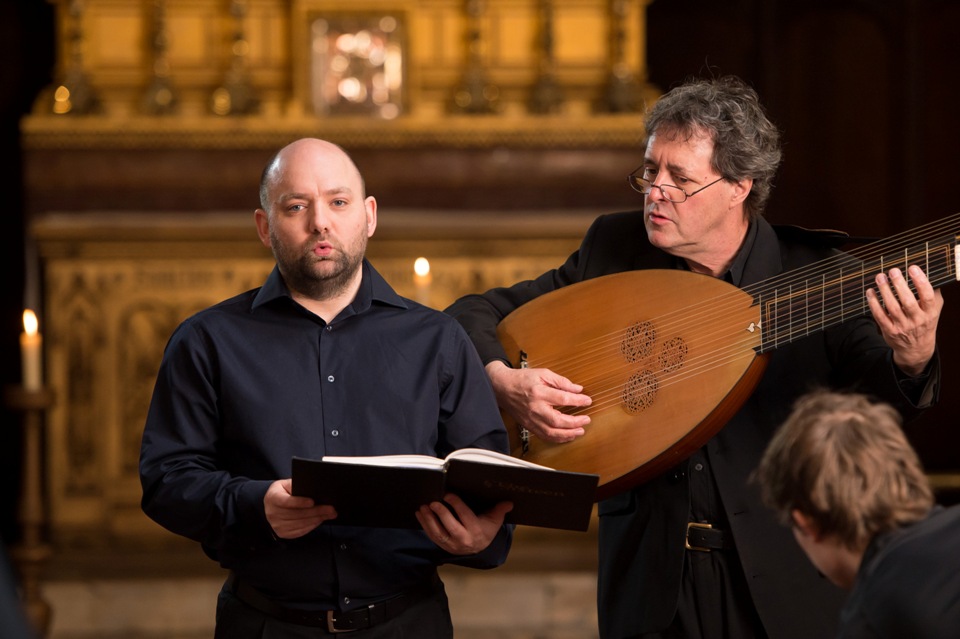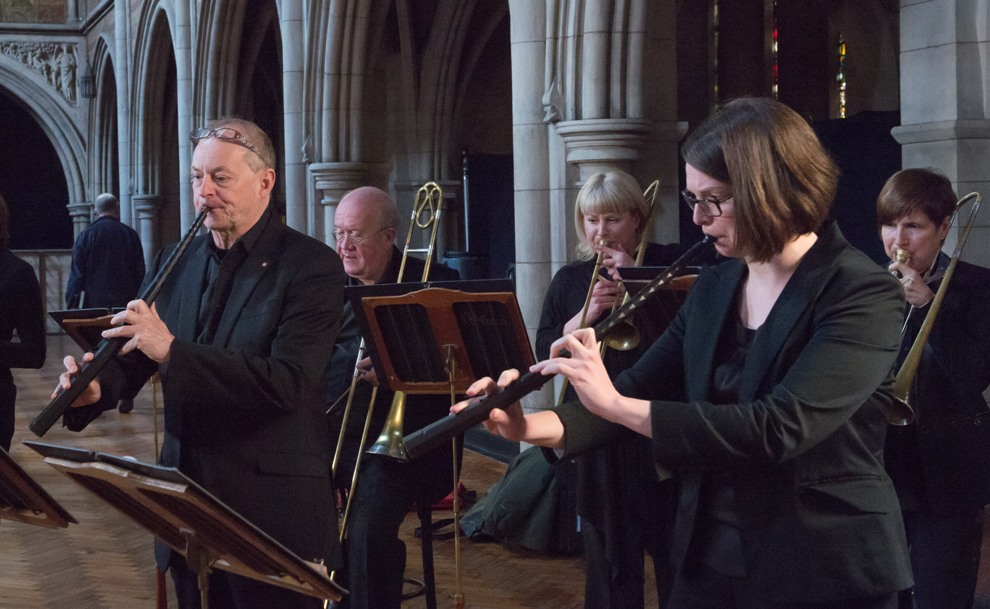It has to be the ultimate cornucopia of choral and early-instrumental invention. So long as the musicians immerse themselves in the beauty of a strange adventure, it doesn’t matter where you hear Monteverdi’s Vespers of 1610: however selective the acoustic, you’ll always get something out of one rare combination of sounds or another. The challenge of The Sixteen on their latest tour was never going to be one of communication, only of adapting in the move between cathedrals and concert halls.
If the Winchester experience began in the aural equivalent of a dimly-lit room, it ended in total incandescence. The great opening blaze with the tuckets adapted from L’Orfeo’s opening toccata sounded murky from my seat seven rows and a crossing space back from the performers in their surprisingly narrow space, their sound seeming to fall dead some way in front; to catch the real opulence, you had only to look upwards at the nave’s stupendous lierne vaulting – constructed circa two centuries before the Vespers’ composition, but a parallel forest of invention.
 Soon, though, tenor Mark Dobell and chitarrone player David Miller (pictured right) arrived within a metre of us and unfolded the first of the "sacred concertos" which in the 1610 edition replace the usual plainchant antiphons heard in St Mark’s Venice, and melted me with florid urgency. It wasn’t exactly voluptuous beauty for the first of the ravishing settings of the Song of Solomon, and when sopranos Grace Davidson and Charlotte Mobbs took up the lovesong strain in “Pulchra es” it was more a matter of penetration, if you’ll forgive the term in this context, than sheer sensuousness.
Soon, though, tenor Mark Dobell and chitarrone player David Miller (pictured right) arrived within a metre of us and unfolded the first of the "sacred concertos" which in the 1610 edition replace the usual plainchant antiphons heard in St Mark’s Venice, and melted me with florid urgency. It wasn’t exactly voluptuous beauty for the first of the ravishing settings of the Song of Solomon, and when sopranos Grace Davidson and Charlotte Mobbs took up the lovesong strain in “Pulchra es” it was more a matter of penetration, if you’ll forgive the term in this context, than sheer sensuousness.
The penetrating force became a virtue in the earthy assumption of seraphim from Dobell and Jeremy Budd, joined by bass Ben Davies for an evocation of the Trinity. And from this point onwards the Sixteen hit their stylistic stride, one of urgent expression to drive home the revolutionary nature of Monteverdi’s “I can do anything”, and I was hooked, flipped upside down, dazzled. There was no hint here of the "Anglican primness" excoriated in Stephen Walsh's parallel review of a very different Vespers last night. The big choral settings either side of the interval stamped and danced, the special guest appearance of the Winchester Cathedral Choir trebles to hold the seraphic chant in the “Sonata sopra Sancta Maria” gave another holy turn of the screw, and the players were unleashed to show their full virtuosity in the “Ave maris stella” followed by what has to be the most resourceful Magnificat before Bach.
 As is customary in most performances of the Vespers, this was the more opulent of the two final settings in an admirably full realisation of the published 1610 edition (hopefully the time is past of ascetic, purifying authenticists weeding out the gloriously profane from the sacred and sticking in boring old plainchant – boring in this context, that is, though its simplicity has a place elsewhere). And while the cathedral acoustics may have muddied earlier ensembles, they seemed to revel in Monteverdi’s pared-down layering of cantus firmus with sheer instrumental and polyphonic brilliance.
As is customary in most performances of the Vespers, this was the more opulent of the two final settings in an admirably full realisation of the published 1610 edition (hopefully the time is past of ascetic, purifying authenticists weeding out the gloriously profane from the sacred and sticking in boring old plainchant – boring in this context, that is, though its simplicity has a place elsewhere). And while the cathedral acoustics may have muddied earlier ensembles, they seemed to revel in Monteverdi’s pared-down layering of cantus firmus with sheer instrumental and polyphonic brilliance.
The lower resonances of Jan Spencer’s violone and the supernaturally solemn sackbuts were beautifully bolstered; the dulcian and cornets which hadn’t blazed at the start now had their moment in the sun (brass ensemble pictured above), and solo fiddling led by Sarah Sexton shot up heavenwards through the glorious vault. Budd, ushering in from the pulpit the last of the many changes Monteverdi rings on each Gloria, led the final fireworks. It was giddying stuff, seemingly possessed – no small thanks to Harry Christophers - of that moment in live performance which goes beyond the bounds of normality. I want to hear this interpretation again and (thanks to the imminent CDs, as well as a promised television documentary) again.
- Four more performances in November including London's Cadogan Hall. Some tickets still available for Rochester, Guildford and Peterborough cathedral performances in January













Add comment